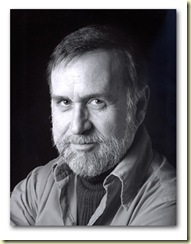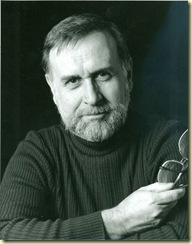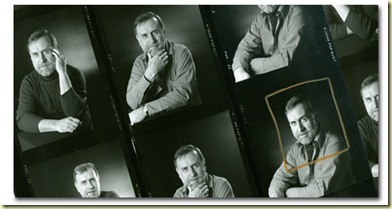I got an e-mail Saturday while driving down to Arkansas from Lonnie Miller, one of my best friends back from my school days in Delphi, Ind.
The e-mail asked if I was going to post something about Dick Laughlin at dicklaughlin.com.
Huh?
So the next day when we stopped by Maria's apartment to haul a carload of her stuff to our new house, I connected my laptop to her Internet hookup and went to the website.
Holy crap! Laughlin died Sept. 5  and they had a memorial celebration for him on Oct. 15. I guess my ties with the Delphi crowd have gotten pretty loose, because I would have liked to have been able to attend.
and they had a memorial celebration for him on Oct. 15. I guess my ties with the Delphi crowd have gotten pretty loose, because I would have liked to have been able to attend.
Dick Laughlin was band director (the entire music department) at Delphi from my eighth-grade year through my junior year. And he was unquestionably the most influential teacher in my formative high school years.
Delphi was Dick's first teaching job after he graduated from what was then Indiana State Teachers College in 1958. He was only 22, so he wasn't that much older than his students and his arrival marked the first time any of us had seen a teacher who seemed to have the same enthusiasm and values as our generation. Not finding anyone interesting his own age in Delphi, Dick quickly took to hanging out with his students.
And he had flash and style. He drove a white Buick convertible with red leather upholstery. He was quite clearly the coolest person we'd ever seen and we reveled in his flamboyance, even down to the pink rhinestone-encrusted eye patch he affected. And anytime I think of him on the podium or in his office, I see him with a click-type ballpoint pen behind his right  ear.
ear.
For the first couple of years, Dick lived in an couple of rented rooms in the upstairs of an elderly widow on Franklin Street. He had a Fisher console Hi-Fi that he eventually had converted to stereo and introduced those of us who were interested - me, for sure - to grand new musical vistas and the world of jazz in particular.
Were it not for Dick Laughlin, I would never have had a complete Dave Brubeck collection, anything by Dizzy Gillespie or Thelonius Monk or Charlie Mingus, or a subscription to Down Beat magazine. And I probably wouldn't have known anything about Dimitri Shostakovich if Dick hadn't made me research and write a report on the Soviet composer as penance for some infraction in junior high school band.
Delphi High School's music program was lackluster before Dick Laughlin showed up. He quickly instituted a series of winter and spring concerts, made drastic improvements in the marching band and, among other things, recruited me from the trumpet section to Sousaphone in marching and concert band. He also created a swing choir called Top Twenty, made up of the top 20 vocalists in the school (I sang bass in Top Twenty my sophomore-through-senior years), and the dance band (I played third trumpet) that performed at concerts and even played a couple of low-budget proms at other schools.
He inspired a lot of us to major in music in college. I went to Dick's alma mater, Indiana State, with the intention of majoring in music. I quickly discovered that I was way out of my depth, not having the background in music theory that students from larger high schools brought to State. I wanted to be a musician, but I just didn't have the natural talent for it. My love for music, then, made me an avid listener and collector, something I like to think bore fruit in the musical careers of my two sons. They grew up on a world filled with music. There was music playing almost every waking hour in the house, in the car, wherever. And when Sean and Steve showed an interest in music, I did whatever I could to support and encourage their growth.
Somewhere around 1960, Dick got married to a girl he had dated in college. Her name was Carol and she was a music teacher in nearby Monticello at the time.
I think the marriage lasted about a year and through the experience, Dick came to terms with the fact that he was gay. This was at a time when gays - especially small Indiana towns like Delphi - kept their sexual preferences in a very deep closet.
If my parents figured out he was gay, they never said anything to me about it or discouraged me from hanging out with him. He was always welcome in my parents' house and my parents treated him as something between a peer and a contemporary of mine.
Needless to say, we were all devastated when he decided to go back to Indiana State for a teaching fellowship. Dick's popularity made him an incredibly hard act to follow. His successor, a little guy from Nashville, Ind., named DeWees, made a game attempt, but I think he knew he was working with Dick Laughlin's musical legacy.
I remained peripherally aware of Dick's career in the late '60s and beyond. I think the last time I saw him was around 1972 or '73 when he came to my house to pick up a caricature of himself that had been drawn by Indianapolis News artist Ron Schwartz and that had appeared in The News in connection with Dick's work at Beef & Boards. We lived a few blocks from each other in Indianapolis for probably 20 years, but had virtually no contact.
I'm still processing the news of his death at 71. It's hard to digest, especially since my memories of him are of a musical force of nature in his 20s with a world of possibilities laid out before him.
He wrote some very complimentary and flattering things in my high school yearbooks and I'd quote from those if I could, but unfortunately they're in a SmartMove vault somewhere between Indianapolis and Brookland, Ark., at the moment. Maybe later, if I find something worth adding.
Even though Dick Laughlin hasn't been a presence in my life for nearly 45 years, it's hard to realize that he's really gone.

No comments:
Post a Comment